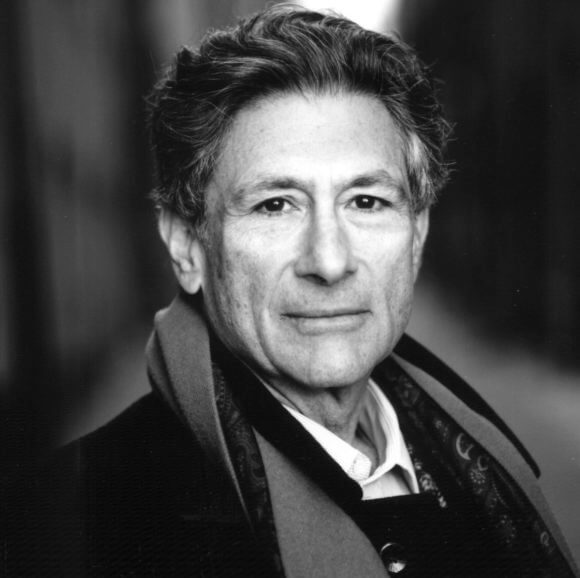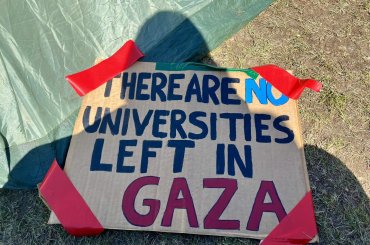Since the beginning of the formation of his political consciousness in 1967, Edward Said emerged as the world’s most significant moral intellectual since Jean Paul Sartre and Bertrand Russel. As professor of literature and literary criticism and spiritual figurehead of the Palestinian cultural landscape, together with Ghassan Kanafani, Mahmoud Darwish, and countless others, he was instrumental in making Palestine one of the predominant moral causes of our time. His dedication to fundamental Palestinian human rights elevated him to a status of icon and inspiration.
After the official leadership of the Palestine Liberation Organization signed the infamous Oslo Accords in 1993, Said began to argue that it was high time that the Palestinian people moved away from the illusion of the two-state solution and advocate a democratic approach, one that could guarantee their basic rights, namely freedom, equality, and justice.
I was inspired by Edward Said because I belong to a generation that did not witness the Nakba. I am part of a generation that was thought to be resigned to more than 50 years of military occupation, and more than 70 years of dispossession and apartheid. Herein comes Edward Said, a member of the Nakba generation with a different world-view, telling us something “new,” or rather reminding us and the world about the basics of human rights — that Palestinians are worthy of freedom and self-determination like the rest of the peoples of the world. Said said this can only be achieved through a secular Democratic Palestine (even though, I must admit, he was not clear enough about the differences between bi-nationalism and secular democracy as the most suitable solution.) According to Said, this was the way out of the quagmire created by Western Zionism in the heart of the Arab world.
I am thinking about Edward Said because following the Israeli Knesset’s passage of the racist nation-state law, the Trump’s administration so called “deal of century,” Israel’s colonialist decision to steal a chunk of the occupied West bank, and the deadly, and the ongoing medieval besieging of the Gaza Strip, we in Palestine have been reconsidering many of the taken-for-granted “wisdoms!” I also have been thinking about Aime Cesaire, Frantz Fanon, Steve Biko–among other anti-colonial, intellectual activists about the ways they would have theorized our situation in a similar way that Edward Said did for us.
What would Said himself have said about what I call Palestinian neo-nationalism? I use the term Palestinian neo-nationalism to refer to everything that beautifies occupation, endorses normalization, and defends the racist two-state solution as the solution to the Palestinian question regardless of the glaring fact that it denies the rights of two-thirds of the Palestinian people, namely refugees and Palestinian citizens of Israel. It is best embodied by the Oslo Accords, which was signed by the right-wing leadership of the PLO, and survived over the last two decades with the encouragement and support of the EU, official Arab regimes, the US, and the World Bank which nominated one of its employees to the position of prime minister of the Palestinian Authority!
Said, and all other anti-colonial heroes mentioned above, would have had very well thought out answers to those who think there is no alternative to the current deadly status-quo in Palestine — as if there was no alternative to occupation, colonization, and apartheid. My late mother, who was illiterate, summed it up very eloquently in 1993, the year the disastrous Oslo Accords were signed. As many people took to the streets to celebrate the deal that, “would bring about prosperity and turn Gaza into the Singapore of the Middle East,” she simply asked: do these agreements allow us to return to Zarnouqa? She was referring to the village from which she, together with tens of thousands were ethnically cleansed from by Zionist militias.
Hence our call for BDS and secular democracy in historic Palestine. We are inspired by the first anti-apartheid movement and other struggles against settler colonialism, and by the great ideas of those intellectuals, and I must add, freedom fighters. Freedom, Justice, and Equality Or Nothing is our slogan. This is how we create space where, as Aime Cesaire put it, “there’s room for everyone at the rendezvous of victory.”



Dear Brother Haidar,
In the same spirit of the successful anti-colonial and anti-imperialist struggles and out of total respect for the memory and precious sacrifices of Palestine’s martyrs, our liberation slogan should be “Freedom, Justice and Equality or Death”. Also, in my humble opinion it makes no sense to struggle to achieve a bi-national state in Palestine. There are no two nations living between the River and the Sea and hence that goal is irrelevant and incorrect.
Our struggle, like South Africa’s before us, is an anti-colonial, anti-apartheid struggle against a settler-colonial regime linked to and sponsored by US led world imperialism and based on extreme settler violence towards the indigenous natives and ethnic cleansing. The Israelis are no more a legitimate nation with a legitimate claim on any part of historic Palestine than the Africaners were in S. Africa.
As in S. Africa the struggle for freedom, justice and equality in historic Palestine is best centered on a one democratic, secular, anti-racist state solution where Jews, Christians, Muslims, others, Arabs and non-Arabs can nationally self-determine themselves as part of one unified Palestinian nation. In that framework, the Jews can establish a secure, safe homeland for themselves just as the Armenians did before them.
Also, if democracy is the goal as it should be, we Palestinians must insist that no particular religious community can be dominant over the others since as we know a Jewish Democratic state is in itself an oxymoron.
In appreciation of and learning from the mistakes made by the ANC in South Africa, we need to recognize the inherent need to abolish the racial capitalism that is the underpinning of Zionism since eliminating political Zionism alone is insufficient to achieve total liberation and leaves economic Zionism and its associated gross inequality intact.